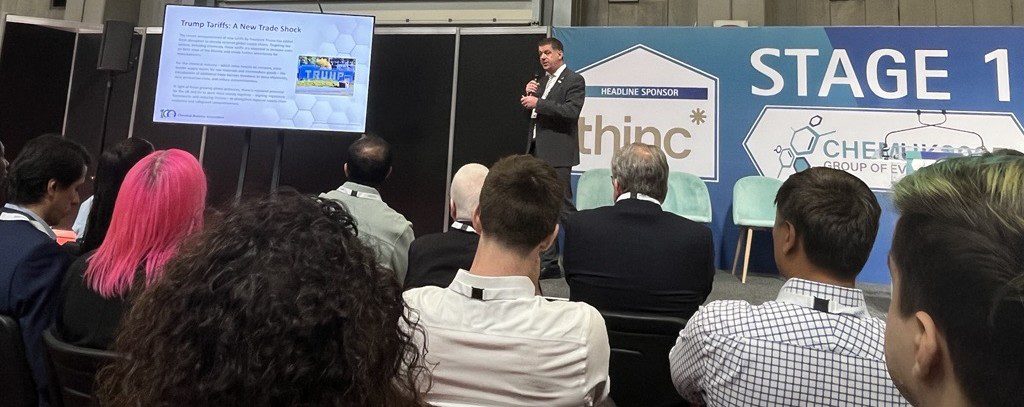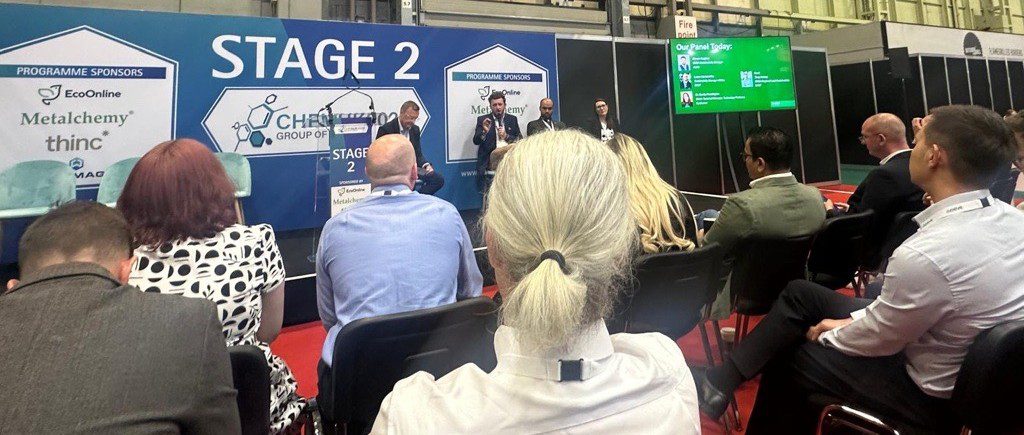Last week CHEMUK 2025, the UK’s largest expo for the chemicals, process engineering and formulated product industries, took place.
The 2-day event brought together Chemicals professionals and thought leaders from around the world and spotlighted both the opportunities and the complexities facing the industry – technologically, geopolitically, and environmentally.
While new innovations and strategies took centre stage, the underlying message was clear: the path ahead demands talent that is adaptable, technically skilled and sustainability minded. In this article I share the key themes that emerged at CHEMUK, and what they mean for talent across the UK and EU chemicals industry.
Technology: From Concept to Cobots
CHEMUK 2025 showcased the transformative power of technology across the chemicals supply chain. From warehouse robotics to advanced process automation, the message was consistent: the digital revolution is here, and it’s accelerating.
Tim Doggett, CEO of the Chemical Business Association (CBA) held a session on day 1 of the conference where he discussed “The UK Supply Chain in a Rapidly Shifting World”. Tim emphasised the importance of investing in technology – noting that while AI has existed since the 1940s, its real-world applications in chemicals are only now starting to scale. Chemical organisations that embrace these tools stand to gain in agility, efficiency and competitiveness.
Clare Bottle, Chief Executive of the UK Warehousing Association’s session, “The Warehouse of the Future in Chemical Supply Chains”, highlighted that only 10–15% of warehouses currently use robotics or automation. As cobots become more accessible, their integration into supply chains will increasingly be the norm – not the exception. Clare also stressed that warehouse managers must now develop both technical and technological understanding to lead these changes effectively.
The theme of technological enablement continued across both days of CHEMUK, including in sessions hosted by the Centre for Process Innovation (CPI), which explored how cutting-edge automation and digital tools can accelerate and de-risk formulated product development. In the session hosted by Innovate UK, “Demystifying AI and Digital Tech for the Chemical Sector”, panellists discussed which technologies are not only cutting edge but also practically implementable – offering guidance on how companies should prioritise R&D investment and avoid ‘shiny object syndrome’.
Across all these discussions, a clear need emerged for a digitally fluent workforce. From R&D labs to distribution centres, talent must be able to navigate an increasingly automated and data-driven environment. The rise of cobots, AI tools and sensor-rich processes demands cross-functional professionals – people who are as comfortable with chemistry as they are with coding, and as familiar with lab processes as with logistics tech.
This shift doesn’t just affect operational roles. For senior leaders and executives, technological change is reshaping the very nature of strategic decision-making. Boards and leadership teams must increasingly include individuals who understand the potential – and the risks – of digital transformation. Technology is no longer just an IT or operations issue; it is a core business driver that affects investment decisions, risk management, supply chain resilience and competitive positioning.
For both emerging and established leaders, the message is clear: technological fluency is now a core component of executive leadership in the chemicals sector.

Diversification in a VUCA World
In a volatile, uncertain, complex and ambiguous (VUCA) world, supply chain resilience was a core concern at CHEMUK. Speakers highlighted the fragility of overly centralised supply routes, with lessons drawn from Brexit, the COVID-19 pandemic and ongoing geopolitical tensions. Tim Doggett’s keynote urged organisations to:
- Map out their supply chains
- Diversify their supplier base
- Conduct regular risk assessments
The message was clear: resilience equals competitiveness.
Supply chain and procurement roles are expanding beyond cost and efficiency metrics. There is a growing need for strategic leaders who can assess risk, manage supplier relationships globally and adapt quickly to shifting conditions. This could lead to a rise in demand for talent with geopolitical awareness, language skills and cross-border logistics experience – particularly in regulatory-heavy sectors like chemicals.
Trade Relations and Tariffs: A Sector Caught Between Policies and Politics
Among the most talked-about topics at CHEMUK 2025 was the newly announced EU–UK trade agreement. With the deal arriving just days before the conference, it provided a timely backdrop for a lively panel discussion that drew a full audience.
Speakers noted the deal’s potential as a starting point but expressed frustration at the lack of clarity on key areas like mutual recognition, regulatory divergence and dynamic alignment. The long shadow of Brexit still looms, with uncertainty continuing to hinder business planning, investment and compliance processes on both sides of the Channel.
Importantly, this wasn’t the only forum in which trade was discussed. Broader global trade dynamics were a recurring theme throughout the two days, with many speakers referencing the geopolitical tensions and shifting alliances that are reshaping the chemicals supply chain.
During one panel discussion Ellen Daniels, CEO – British Compressed Gases Association (BCGA), said:
"“We live in unprecedented times. The geopolitical landscape is constantly shifting and it’s almost impossible to predict from one day to the next what tariffs will look like.”"
The volatility of US tariffs, for example, have created whiplash for businesses trying to navigate fluctuating costs, disrupted sourcing routes, and shifting export strategies. The global chemicals industry thrives on predictability and long-term planning – something in short supply over recent years.
However, with the new EU–UK agreement in place and diplomatic efforts continuing across other major trade corridors, there is hope that a more stable and cooperative era may be emerging.
This evolving trade landscape places fresh demands on professionals in regulatory affairs, supply chain management, commercial strategy and legal compliance. In the UK and EU alike, there is growing need for talent that understands the intricacies of international trade – from tariffs and rules of origin to REACH regulations and border protocols.
For senior leaders, the ability to interpret policy and pivot strategy in response to external shocks is now a critical leadership skill. Organisations will increasingly seek out professionals who can blend geopolitical awareness with regulatory and commercial expertise – ensuring their organisations remain agile, compliant and competitive in an unpredictable world.
Net Zero: Leadership-Driven, Not Just Investor-Led
In one of the most compelling sessions at CHEMUK, “Navigating Net Zero – Where Are We Now?”, panellists from Synthomer, BASF and Azelis shared both their achievements and ongoing commitments to net zero.
From top-down leadership commitment at Synthomer to BASF’s investment in alternative feedstocks and Azelis’s investor-driven ESG integration, the message was unified: net zero is non-negotiable, and ESG is a business imperative – not a regulatory checkbox.
Tony Heslop of BASF closed with a salient point:
"“ESG isn’t just about compliance—it’s about resilience. It tells investors whether you’re profitable today and investable tomorrow.”"

Net zero and ESG commitments are shifting from the sustainability department to the C-suite. That means the entire workforce – especially leaders – must be aligned with sustainability principles. For senior and executive-level professionals, having demonstrable ESG literacy will be a differentiator.
Final Thought: A Sector in Transformation Requires Talent in Transition
What emerged clearly from CHEMUK 2025 is that the chemicals industry is evolving rapidly – and not just in response to external pressures. The internal drive for sustainability, digitalisation and resilient operations is transforming every layer of the value chain.
As a result, organisations across the UK and EU must rethink how they attract, develop and retain talent. The future of the sector rests on a workforce that can blend technical depth with adaptive thinking, sustainability values and digital competence.
In short, the chemicals industry doesn’t just need more people. It needs the right people – those equipped to lead, innovate and thrive in a world where transformation is the new normal.
For a conversation about the topics discussed in this article, or about your organisation’s talent strategy, please don’t hesitate to get in touch.

Adam Harman
Partner | Industrial Markets | EMEA
E: adam.harman@weareprocogroup.com T: +447990 306595




